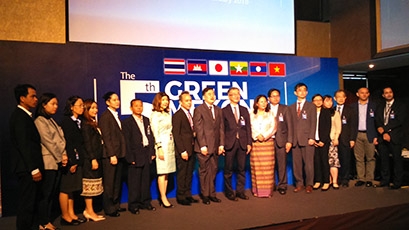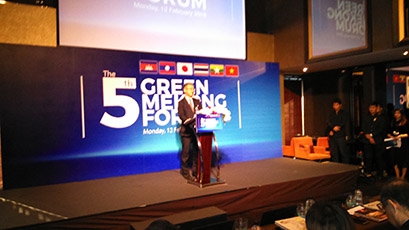Asia
Outline of the 5th Green Mekong Forum
February 14, 2018


- The Government of Japan and the Royal Thai Government co-hosted the 5th Green Mekong Forum in Bangkok, the Kingdom of Thailand, on February 12. The Forum was co-chaired by H.E. Mr. Arthayudh Srisamoot, Director-General, Department of International Economic Affairs, Ministry of Foreign Affairs of Thailand, and Mr. Fumio Shimizu, Deputy Director-General, Southeast and Southwest Asian Affairs Department, Ministry of Foreign Affairs of Japan.
- Participants from Japan and the Mekong countries (the Kingdom of Cambodia, the Lao People’s Democratic Republic, the Republic of the Union of Myanmar, the Kingdom of Thailand, and the Socialist Republic of Viet Nam), United Nations Environment Programme(UNEP), United Nations International Strategy for Disaster Reduction(UNISDR), United Nations Economic and Social Commission for Asia and the Pacific(ESCAP), Asian Institute of Technology and The Asia Foundation exchanged views and experiences. Representatives from Australia, India, the Republic of Korea, United States of America, the relevant organizations and private companies also attended this forum.
- In session 1, participants discussed "Sustainable Mekong" (climate change and renewable energy).They pointed out the region's significant vulnerability to climate change and the need for public awareness on renewable energy, information sharing, financing and the capacity building for better access to the existing financing programs, data collection, and integration of climate change adaptation and the disaster risk reduction. The role of new technology and the importance of Joint Crediting Mechanism (JCM) were also highlighted. In Session 2, they discussed "Disaster Risk Reduction and Water Resource Management". In addition to sharing the progress and the experiences on measures taken by each country, they pointed out the importance of integrated water resources management, data sharing, capacity building for data collection and monitoring, building a resilient society through risk sensitive development which composed a basic principal of Sendai Framework for disaster risk reduction, as well as of realizing more integrated cooperation among different initiatives through dialogue.
- The attendees and the agencies shared the determination to strengthen the Mekong-Japan Cooperation under the Action Plan for ‘A Decade towards the realization of Green Mekong’ Initiative, with an emphasis on environmental sustainability, inclusiveness and economic growth, in order to tackle the issues related to environment and climate change and to strengthen the connectivity within the Mekong region.
- The outcome of this Forum will be reported to the 11th Mekong-Japan Foreign Ministers’ Meeting this year.

